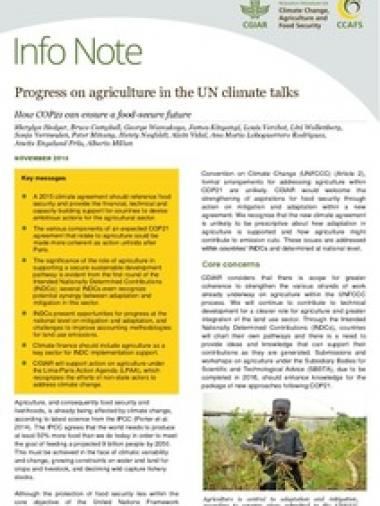Progress on agriculture in the UN climate talks: How COP21 can ensure a food-secure future

Agriculture, and consequently food security and livelihoods, is already being affected by climate change, according to latest science from the IPCC (Porter et al. 2014). The IPCC agrees that the world needs to produce at least 50% more food than we do today in order to meet the goal of feeding a projected 9 billion people by 2050. This must be achieved in the face of climatic variability and change, growing constraints on water and land for crops and livestock, and declining wild capture fishery stocks.
Although the protection of food security lies within the core objective of the United Nations Framework Convention on Climate Change (UNFCCC) (Article 2), formal arrangements for addressing agriculture within COP21 are unlikely. CGIAR would welcome the strengthening of aspirations for food security through action on mitigation and adaptation within a new agreement. We recognise that the new climate agreement is unlikely to be prescriptive about how adaptation in agriculture is supported and how agriculture might contribute to emission cuts. These issues are addressed within countries’ INDCs and determined at national level.
Citación
Hedger M, Campbell BM, Wamukoya G, Kinyangi J, Verchot L, Wollenberg L, Vermeulen SJ, Minang P, Neufeldt H, Vidal A, Loboguerrero Rodriguez AM, Friis AE, Millan A. 2015. Progress on agriculture in the UN climate talks: How COP21 can ensure a food-secure future. CCAFS Info Note. Copenhagen, Denmark: CGIAR Research Program on Climate Change, Agriculture and Food Security (CCAFS).